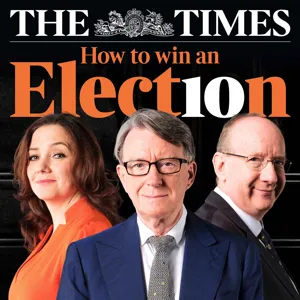Podcast Summary
Staying Vigilant and Adaptable: Burrows Furniture prioritizes customer satisfaction through easy assembly, new colors, durable materials, and fast free shipping. Labour Party focuses on voter loyalty amidst volatile electoral era, adapting under Keir Starmer's leadership.
Both Burrows Furniture and the Labour Party understand the importance of staying vigilant and adaptable in their respective fields. Burrows Furniture focuses on customer satisfaction by offering easy assembly, new colors, durable materials, and fast free shipping. Meanwhile, Labour faces the challenge of maintaining voter loyalty in a volatile electoral era, having lost elections in the past despite strong poll leads. The electorate is more promiscuous and switches parties more easily due to various factors such as financial crises, cost of living crises, and Brexit. Despite the seemingly insurmountable odds after the 2019 election, Labour has made significant progress under Keir Starmer's leadership, demonstrating the importance of staying focused and responsive to changing circumstances.
Labour Party's promising path to a majority: The UK political landscape favors Labour, with the Conservative Party's unpopularity giving them an opportunity to gain ground, especially in Scotland, potentially leading to a reasonably comfortable majority.
The current political landscape in the UK is favoring the Labour Party under Keir Starmer, making them a credible contender for the next general election. The Conservative Party's unpopularity, particularly under Prime Minister Rishi Sunak, has given Labour an opportunity to gain ground. This is especially significant in Scotland, where Labour's improved performance could reduce the number of votes they need in England and Wales to secure a majority. However, Labour strategists are urging caution, emphasizing the volatility of voters and reminding their MPs of unexpected election outcomes. Despite this, the current situation presents a promising path for Labour towards a reasonably comfortable majority.
Labour and Conservatives' Election Strategies: Both Labour and Conservatives are preparing for the next election, with Labour focusing on maintaining voter trust and avoiding complacency, while the Conservatives aim to make it a referendum on Labour's past record. However, each party faces internal challenges: Labour with policy debates and Conservative's inconsistent messaging and leadership.
Both the Labour Party and the Conservative Party are gearing up for the next election, each with their unique strategies. For Labour, it's essential to avoid complacency and continue winning voters' trust daily. The party should not assume a big poll lead guarantees victory. Instead, they need to maintain a balance between offering hope and reassurance. Meanwhile, the Conservatives aim to make the election a referendum on Labour rather than their own record. They'll remind voters of Labour's past record in office and try to reassure them. However, the Tories have had a challenging time finding a consistent message and leadership, which Labour will likely exploit. Despite numerous resets, the Conservative Party's poll numbers have not improved significantly, and many MPs are resigned to losing the next election. Labour, on the other hand, is grappling with internal debates over bold policies and their potential impact on voters' trust in their financial management abilities. Ultimately, both parties must navigate the delicate balance between offering change and reassurance while avoiding complacency and risky messaging. The election outcome will depend on how effectively each party executes this strategy.
Labour party preparing for election and potential government: The Labour party is utilizing civil service talks to discuss policy implementation and is financially preparing for the upcoming election, while factors like tactical voting and campaign finances could also impact the outcome.
The Labour party is preparing for both a campaign to win the upcoming election and for forming a government, as they believe there's a genuine chance they could lose. They are utilizing civil service talks to discuss policy implementation with civil servants before entering office. Meanwhile, factors like tactical voting and campaign finances, which don't often make headlines, could also impact the election. The Conservatives generally raise and spend more than Labour, with the national spending limit for general elections in Britain being raised from £19 million to £34 million. Despite this, the spending still pales in comparison to American elections. Overall, the Labour party is ensuring they're ready to hit the ground running if they win the election.
2023 Election: Labour vs Conservatives - A Battle of Resources and Tactics: The 2023 UK election is a significant competition between Labour and Conservatives, with each party investing heavily and strategically. Labour is responding to the Conservatives' increased spending with a big fundraising drive, while tactical voting and the Liberal Democrats' focus on 'blue wall' areas add complexity to the race.
The upcoming election year is expected to be a fierce competition between the Labour Party and the Conservative Party, with each party focusing their resources strategically. The Conservatives, under Rishi Sunak, have significantly increased their campaign spending limit, signaling their determination to win. Labour, in response, has launched a big fundraising drive to rival the Conservatives' spending capacity, with both private donations and trade union funding. Another significant factor is the phenomenon of tactical voting, which has been a game-changer for parties in the past. In recent by-elections, voters have shown a tendency to support the candidate most likely to defeat the Conservatives, whether it's Labour or the Liberal Democrats. However, there has been no formal deal between Labour and the Liberal Democrats regarding this issue. The Liberal Democrats have focused their efforts on winning seats from the Conservatives in the so-called "blue wall" areas, which have been alienated by issues like Brexit, mortgage rates, and sewage problems. This strategy benefits Labour in two ways: it could help ensure that Labour becomes the largest party if the Conservatives lose a significant number of seats to the Liberal Democrats, and it allows Labour to position itself as the principal opposition to the government, as the Liberal Democrats have less of a national strategy.
Liberal Democrats and Reform Party Threaten Conservatives in UK Election: Labour aims to win disillusioned conservative voters by showing they can bring change through economic growth, countering perceptions of excessive spending and borrowing.
The Liberal Democrats and Reform Party pose significant electoral threats to the Conservatives in the upcoming UK election. The Lib Dems' "blue wool" strategy, targeting Tory seats, could potentially help Labour win more votes. Reform, a party formerly known as the Brexit Party, is also targeting Tory seats and could split the vote. Labour's overall poll lead is strong, but their share of the votes has dipped slightly due to disillusioned conservative voters turning to Reform. Labour's campaign message is that the Conservatives have failed the country and that change is needed. Keir Starmer is presented as a prime ministerial alternative. Labour aims to counter the perception that they are only interested in spending money and borrowing, and instead, show that they can generate wealth through economic growth. Some of their targeted pledges include improving economic growth, which has been poor since 2016, and addressing specific issues like the cost of living and the NHS. Overall, Labour's strategy is to appeal to disillusioned conservative voters and show that they have the ideas and leadership to bring about change.
Labour's net-zero goal, state investments, and targeted tax promises: Labour's election strategy includes reaching net-zero emissions, substantial state investments, and targeted tax rises to fund their plans. Class consciousness, Scotland, and key seats also play significant roles.
The Labour Party's goal of reaching net-zero emissions by 2030, now downgraded to an ambition, remains a significant theme in their campaign due to its importance in their growth strategy. This decarbonization plan relies on substantial state investments. Additionally, Labour's targeted promises on tax rises, such as abolishing non-dom status and adding VAT to private school fees, serve political purposes. Class consciousness is a prominent issue for Labour, contrasting with New Labour's post-class era approach. Scotland, the blue wall, and reform are crucial factors in this election, with small swings in key seats potentially making a significant difference. Unforeseen events, like the post office crisis, can also significantly impact the campaign. Rishi Sunak and Keir Starmer's performances on the campaign trail will be crucial, with Sunak's perceived techiness raising concerns among the Tories. Overall, the election outcome won't solely depend on the Labour-Conservative contest but also on various other factors.
The Conservatives aim to win the upcoming election despite unexpected events and long tenure in power: The Conservatives are determined to win the upcoming election and avoid being labeled as the losing party after a long tenure, while unforeseen events add to the election's uncertainty. Listeners can submit questions for future podcast discussions and learn about Quince's affordable travel essentials and United Healthcare's short-term insurance plans.
The upcoming election is expected to be a hard-fought battle due to the significant stakes involved. The Conservatives, who have been in power for a long time, do not want to be remembered as the party that lost office during this long reign. Unforeseen events, such as John Prescott punching a voter, have added to the unexpected nature of this election. Richie Suneck, the leader of the Conservatives, is determined to win and avoid being labeled as the leader who lost after such a long tenure. The election is predicted to get heated, and listeners are encouraged to submit questions for future podcast discussions at newstatesman.com/youaskus. Additionally, the podcast episode was produced by Katherine Hughes, and listeners were introduced to Quince, a company offering high-quality travel essentials at affordable prices, with free shipping and 365-day returns. A fun fact was shared that a crocodile cannot stick out its tongue, and United Healthcare short-term insurance plans were mentioned as an option for people between jobs, coming off their parents' plans, or turning a side hustle into a full-time gig. These plans offer flexible, budget-friendly coverage with access to a nationwide network of doctors.





